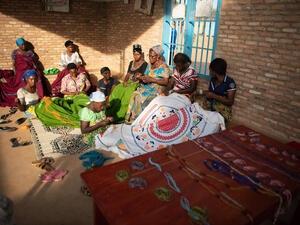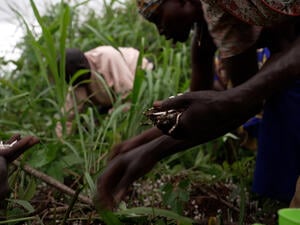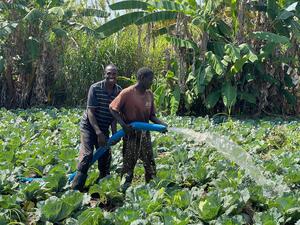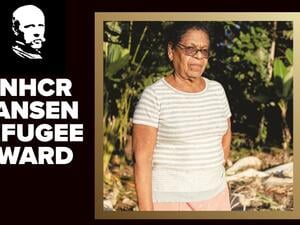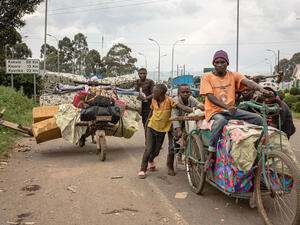Uganda farming classes transform refugees into entrepreneurs
Uganda farming classes transform refugees into entrepreneurs

Chilli pepper growers receive training on the different products that can be produced and marketed from the chilli peppers they are growing at Rwamwanja settlement in south west Uganda.
RWAMWANJA, Uganda – At home in the Democratic Republic of the Congo, police reservist Kwizera Gasigwa farmed cassava and maize for his family to eat and to sell, to help his meagre income stretch a little further each month.
But when war forced them to flee to neighbouring Uganda, it was difficult for Gasigwa, 39, to see his family depend on food rations from humanitarian agencies.
He dreamt of being independent again and was determined to change the circumstances for his wife, Nyiranzabi, 36, and their three children aged between eight and 20.
That opportunity came with a project from UNHCR, the UN Refugee Agency, and the Japan International Cooperation Agency, which aims to boost refugees' self-sufficiency by training them how to farm rice more efficiently, and connecting them to markets for their harvests.

Congolese refugees plant rice seed in the fertile land at Rwamwanja settlement in south west Uganda.
Gasigwa was among 50 refugees in Rwamwanja settlement who benefited from the programme. Two years later he has earned enough money to start a series of other small businesses.
“Growing rice has enabled my family to purchase a motorcycle that I use to carry passengers,” he says. “My wife has opened a grocery shop and things are looking good for my family.” They have also started rearing pigs and ducks.
“Farming is not only a means to an end, but a way to use the profit to establish oneself in other livelihoods activities,” Gasigwa says. “Now I can make choices. My dream to improve my family’s income has been realized."
He took advantage of Uganda’s innovative settlement approach to managing and protecting refugees, where they are given plots of land to build a home and farm. Their movement is not restricted, and they can earn money as they have the right to work and establish businesses.
“UNHCR is supporting refugees to live with greater dignity by providing training in modern ways of farming crops, allowing them to earn money, help them adjust to their new environment and peacefully co-exist with their Ugandan neighbours,” says Albert Akandonda, UNHCR's livelihoods specialist who focuses on agriculture in Rwamwanja.
During the training, Gasigwa received one kilogramme of rice seedlings, which he nurtured into an eventual harvest of more than 900kg of rice.

"There is nothing like cultivating crops that can earn you a lot of money," says Congolese refugee John Bosco Kalaginla as he waters his chilli pepper crop in his garden at Rwamwanja settlement in south west Uganda.
Gasigwa's success means he has been able to train others, and he has even started a savings and loans group for both refugee and Ugandan farmers. The group gives credit to its members, especially women looking after their families on their own, to set up small businesses to improve their earnings.
“Ugandans have learnt a lot from the refugees in respect to rice farming" says Christopher Ndyamuhaki, a Ugandan and member of the group. "The refugees have benefited from Ugandans, who have rented out five acres of land to the rice farmers.”
There are still challenges, however. The price the rice farmers can charge is low because they cannot store their harvests to wait for higher prices in the market, and they rely on middle-men.
These are challenges that can be overcome. The Lutheran World Federation, which partners with UNHCR, taught another group of refugee farmers how to grow chilli peppers and linked them directly to exporters to give them a ready market without falling victim to unscrupulous brokers.
"Cultivating crops that can earn you a lot of money is rewarding," says John Bosco Kalaginla, one of the Congolese refugees farming chilli pepper. Like Gasigwa, he is grateful for the money the cash crops bring his family for difficult times. "We want to plant crops that will enable us survive hardships," he adds.


